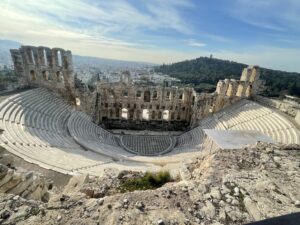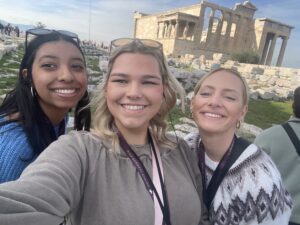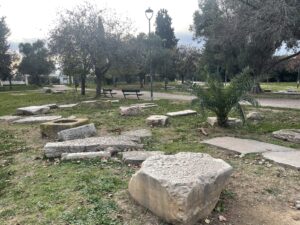Spending this past week in Greece has offered me many unique and once-in-a-lifetime opportunities to expand my cultural awareness and education. Beyond learning about the fascinating and innovative lives of the early Athenians and seeing how their impact directly influenced American ideas, this trip has taught me how to interact with and respect other cultures, and how to explore the world. I have met many locals eager to help me navigate Greece, whether that was helping me decide what food to order, offering directions, or assisting my group with our scavenger hunt. The people have been incredibly friendly and willing to help and share some of their stories.
Visiting ancient sites, such as the Roman and Athens Agoras, the Acropolis, Muses Hill, the sites of Plato and Aristotle’s schools, and many others, was awe-inspiring because of these places’ beauty, history, and significance. Learning about the people who successfully led an innovative and advanced society 4000 years ago has provided me with many leadership skills to expand my knowledge of cultural and global business intelligence. The successful rulers of these times listened to the people and allowed them to participate in the politics and economics of the city. They showed confidence in their ability to lead through tumultuous times, perseverance when Athens fought brutal wars, and devotion to improving and growing their country. Each of these skills applies to being a global leader because of the challenges faced trying to connect people with language, cultural, and ethical differences.
One thing I have found very admirable about Greek culture is the importance placed upon ensuring the history of Greece is accessible and expressed to the public. At the Acropolis Museum, we saw how archaeological dig sites are placed under clear glass so all may see them, but the land can still be used for the museum. This practice is seen throughout Greece; as our guide Maria explained, private property owners who stumble across archaeological finds also place glass so that all may see the find, but the property owner can still use their property for whatever purpose they intended rather than the land being completely turned over for research and preservation. I especially appreciated how the City of Athens continues to uphold the tradition of educating its citizens as they did during the run of Dionysus Theatre in the fourth century B.C. During this time, people all-day events to witness tragedy, comedy, and satirical plays aimed at educating the people. Today, live performances are played in the Odeon of Herodes Atticus. The City of Athens sets aside free and reduced-price tickets for eligible citizens to attend the events because they value these events’ education and historical context and prioritize sharing that among Athenian citizens. This practice pulls from the qualities of some of the early Athenian leaders we have discussed, who listened to the people and allowed them a place in the happenings of the city.



